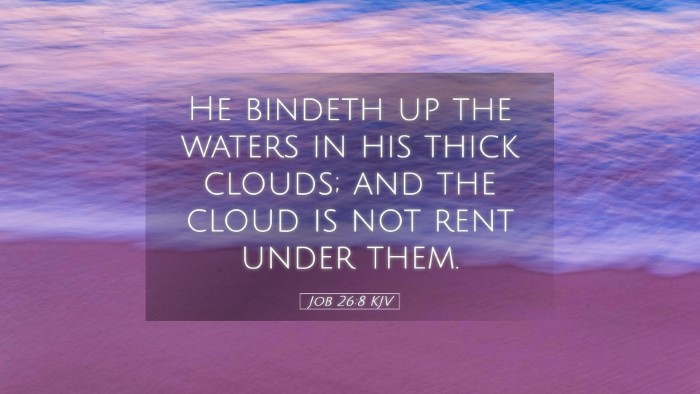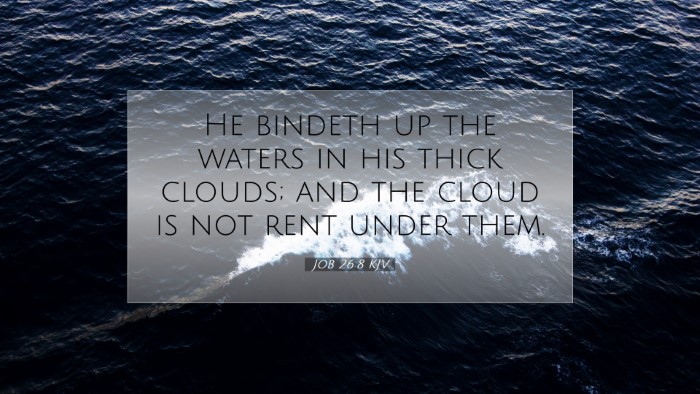Old Testament
Genesis Exodus Leviticus Numbers Deuteronomy Joshua Judges Ruth 1 Samuel 2 Samuel 1 Kings 2 Kings 1 Chronicles 2 Chronicles Ezra Nehemiah Esther Job Psalms Proverbs Ecclesiastes Song of Solomon Isaiah Jeremiah Lamentations Ezekiel Daniel Hosea Joel Amos Obadiah Jonah Micah Nahum Habakkuk Zephaniah Haggai Zechariah MalachiJob 26:8
Job 26:8 KJV
He bindeth up the waters in his thick clouds; and the cloud is not rent under them.
Job 26:8 Bible Commentary
Commentary on Job 26:8
Job 26:8 states: "He binds up the waters in his thick clouds; and the cloud is not rent under them." This verse captures a profound truth about God's sovereignty over nature, illustrating His power and wisdom in creation. Below is a compilation of insights derived from public domain commentaries, carefully combined for a meaningful exploration.
Understanding the Context
Job 26 forms part of Job's response to his friends and is a declaration of God's magnificent power over the universe. Job, amidst his suffering, does not lose sight of who God is and recounts His omnipotence.
Insights from Commentaries
Matthew Henry's Perspective
Matthew Henry emphasizes the majesty of God as articulated in this verse. He notes that
- Divine Control of Nature: God exercises unparalleled control over the natural world. This verse mentions how He “binds up the waters in his thick clouds,” which signifies that God not only creates the waters but also manages them, preventing them from overwhelming the earth.
- The Stability of Creation: Henry illustrates the idea that even powerful elements like water are under divine regulation. The clouds do not “rent” under the weight of water, representing God's ability to sustain creation without allowing it to become chaotic.
- The Assurance in Suffering: In the context of Job's despair, acknowledging God's control offers comfort. By reflecting on nature and God's sovereignty, Job is reminded that despite his suffering, there is an overarching plan and purpose in God's governance.
Albert Barnes' Comments
Albert Barnes delves into a more detailed analysis of the verse, noting several key elements:
- Metaphorical Language: Barnes interprets the imagery of clouds as a representation of God’s providential care over the world, emphasizing that God “binds” water, suggesting His ability to contain and manage chaos.
- God’s Wisdom and Power: The verse serves as a testament to God's wisdom, as the management of natural forces requires profound understanding and skill. The fact that the clouds can hold water without bursting is a reflection of divine wisdom in maintaining order in creation.
- Encouragement for Believers: For believers facing trials, Job's proclamation serves as a reminder of the unshakeable power of God. Despite personal afflictions, His sovereignty remains intact, providing hope and encouragement to trust in His plans.
Adam Clarke's Commentary
Adam Clarke offers a theological interpretation that considers the implications of divine governance:
- Theological Implications: Clarke suggests that God's ability to control the clouds indicates His omnipotence and sovereignty over all creation. This acknowledgment serves to instill awe and reverence in the hearts of believers.
- Natural Elements in Harmony: By managing water's descent from clouds, God prevents flooding and destruction, which suggests that His creations operate harmoniously under His guidance. This providential management promotes faith in God’s ability to oversee the complexities of life.
- Encouragement for the Faithful: In times of trouble, believers can take solace in the fact that even in their darkest hours, God is actively sustaining them just as He sustains creation.
Conclusion
Job 26:8 serves as a powerful reminder of God's authority over the universe. Drawing from the well of wisdom presented by Matthew Henry, Albert Barnes, and Adam Clarke, we see a comprehensive picture of God's sovereign control intertwined with His wisdom and the comfort He offers to those who suffer. This verse not only highlights God’s omnipotence but also reassures believers of His presence in every storm of life.
Further Reflections
As pastors, students, theologians, and scholars meditate upon this scripture, it is crucial to reflect on the themes of divine majesty and providence. The insights drawn from different commentaries can be a springboard for deeper study and application in preaching, teaching, or personal faith journeys.


